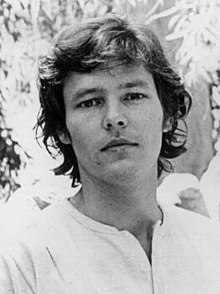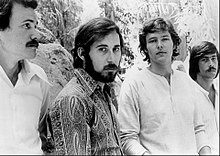This article is about the musician. For other people with the same name, see James Griffin (disambiguation).
| This article needs additional citations for verification. Please help improve this article by adding citations to reliable sources. Unsourced material may be challenged and removed. Find sources: "Jimmy Griffin" – news · newspapers · books · scholar · JSTOR (August 2009) (Learn how and when to remove this message) |
| Jimmy Griffin | |
|---|---|
 Griffin in 1971 Griffin in 1971 | |
| Background information | |
| Birth name | James Arthur Griffin |
| Born | (1943-08-10)August 10, 1943 Cincinnati, Ohio, U.S. |
| Origin | Memphis, Tennessee, U.S. |
| Died | January 11, 2005(2005-01-11) (aged 61) Franklin, Tennessee, U.S. |
| Genres | Soft rock |
| Occupations |
|
| Instruments |
|
| Years active | 1963–2005 |
| Formerly of | |
James Arthur Griffin (August 10, 1943 – January 11, 2005) was an American singer, guitarist and songwriter, best known for his work with the 1970s soft rock band Bread. He won an Academy Award for Best Original Song in 1970 as co-writer of "For All We Know".
Early life
Griffin was born in Cincinnati, Ohio and grew up in Memphis, Tennessee. His musical training began when his parents signed him up for accordion lessons. He attended Kingsbury High School in Memphis and Dorsey and Johnny Burnette were his neighbors and role models. After the Burnette brothers moved to Los Angeles, California to further their music careers, Griffin went there to visit them, and managed to secure a recording contract with Reprise Records.
Career
Solo performing and songwriting
His first album, Summer Holiday, was released in 1963. He had small roles in two films, For Those Who Think Young (1964) and None but the Brave (1965).
In the 1960s, Griffin teamed with fellow songwriter Michael Z. Gordon to write songs for such diverse singers as Ed Ames, Gary Lewis, Bobby Vee, Brian Hyland, The Standells, Lesley Gore, Sandy Nelson and Cher. The pair won a BMI award for "Apologize" sung by Ames in 1968.
Griffin met Robb Royer through Maria Yolanda Aguayo (Griffin's future wife). The two hit it off immediately and became life-time collaborators both as performers and writers. Griffin was a staff writer with Viva Publishing and managed to get them to hire Royer as his co-writer in 1967. Viva was resistant to hiring Royer and instead wanted Griffin to write with another staff writer with the company. According to Royer, Griffin convinced Viva to hire Royer by threatening "I will be writing with him. Do you really want to give away half the publishing on all those songs?". James Griffin sang songs that were featured in a few episodes of the TV series Ironside in the late sixties.
Bread

In 1968, Griffin and Royer teamed with David Gates to form the band Bread using session drummer Jim Gordon for their first album and their initial gigs. Mike Botts soon replaced Gordon as the band's permanent drummer, first appearing on their second album, On the Waters.
In 1970, Griffin and Royer – under the pseudonyms Arthur James and Robb Wilson – wrote the lyrics for Fred Karlin's music for the song "For All We Know", featured in the film Lovers and Other Strangers. It won the Academy Award for Best Song.This song was later covered by The Carpenters on their third album.
In 1971 Royer left Bread, but continued to provide songs co-written with Griffin for the group. He was replaced by keyboardist/guitarist Larry Knechtel. They had a number one Billboard Hot 100 hit with the song, "Make It With You". Other hits by Bread included "Baby I'm-a Want You", "If" and "Everything I Own". Although Griffin was a significant contributor to Bread's albums as a writer and singer, every one of the group's thirteen songs that made the Billboard Hot 100 chart was written and sung by Gates, a situation that created friction between the two.
After the release of Guitar Man in 1972, Bread went on hiatus. Griffin released a solo album, Breakin' Up Is Easy on Polydor Records in 1973, credited to 'James Griffin & Co'. Neither the album nor the singles, "Breakin' Up Is Easy", and "She Knows", made the Billboard charts. Bread reformed in 1976 for one final album, Lost Without Your Love. Gates, Botts, and Knechtel continued to record together on Gates's solo albums, and initially toured as 'David Gates & Bread', which led to a lawsuit from Griffin. The dispute was not resolved until 1984. Griffin and Gates put aside their past differences for a Bread reunion tour in 1996–1997 with Botts and Knechtel.
Black Tie
In 1977, Griffin released a third solo album, James Griffin, also on Polydor, with tracks recorded in 1974 and 1975. He teamed with Terry Sylvester (formerly of The Hollies) on the album Griffin & Sylvester in 1982 and was a member of Black Tie with Randy Meisner and Billy Swan, which released When The Night Falls in 1985, co-produced by T-Bone Burnett. Robb Royer was also credited as a musician on the album. The album was remixed and reissued in the early 1990s, with Griffin's voice more prominent on some songs. The Black Tie single "Learning The Game" peaked at No. 59 on the Billboard country chart in 1991.
The Remingtons
In 1991 Griffin formed The Remingtons with Richard Mainegra and Rick Yancey. They released their first single that same year, followed by the albums Blue Frontier (1992) and Aim for the Heart (1993). Their single, "A Long Time Ago" went Top 10 on Billboard''s country chart in 1992 with "Two-Timin' Me" cracking the Top 20 later that year.
Toast/Radio Dixie
Beginning in 1994 Griffin and Robb Royer collaborated with Grammy-nominated songwriter and multi-instrumentalist Todd Cerney to write songs and perform in local venues. Larry Knechtel also participated in the collaboration and the group called themselves Toast (an obvious reference to Bread). Griffin, Royer and Cerney began this collaboration when they wrote "Kyrie" in 1994. Knechtel also joined songwriting credits on the 1995 song "Slow Train". The group wrote, recorded and performed together at various Nashville Venues including the Bluebird Cafe, 3rd & Lindsley, and 12th & Porter. In 1998 they changed the name to "Radio Dixie" in an effort to be more commercially viable. The group disbanded in 1998, although Royer and Cerney continued to collaborate on song-writing.
GYG
In 2003, Griffin, Rick Yancey and Ronnie Guilbeau began writing and performing as GYG, recording a CD of the same name. The CD included new material and well-known tunes like "Who's Gonna Know", a Remingtons tune recorded by Conway Twitty, and "Call It Love" a No. 1 hit for Poco written by Ronnie Guilbeau. GYG was performing at numerous Nashville venues including the 2004 CRS Conference and making further plans to shop the CD to indie labels and take the act on the road at the time of Griffin's sickness and death.
In early 2004, Griffin recorded a duet with Holly Cieri of his Oscar-winning song "For All We Know". During that same year, Griffin also collaborated with Michael Z. Gordon and Griffin recorded the song, "Something Else Altogether" which was slated to be the title song for the film, "The Devil and Daniel Webster". However, the film went into bankruptcy and the song was never used in the movie but was recently posted on YouTube and dedicated to Griffin.
Death
Griffin died of complications from cancer on January 11, 2005, at his home in Franklin, Tennessee, after undergoing treatment for several months; he was 61 years old. He was survived by his wife Marti, daughters Katy and Alexis, sons Jamey and Jacob, granddaughters Laura and Lilli and grandsons Gryffyn and Max.
References
- ^ "♫ Jimmy Griffin - Jimmy Griffin. Listen @cdbaby". Store.cdbaby.com. Retrieved February 1, 2020.
- "Bread's Jimmy Griffin Dies". Billboard.
- ^ "Dave's Diary - 13/1/05 - Jimmy Griffin RIP". Nucountry.com.au. Retrieved February 1, 2020.
- "Toast (Radio Dixie)". Archived from the original on March 25, 2012. Retrieved June 21, 2011.
- "Bread's Jimmy Griffin Dies". Billboard. Retrieved November 2, 2006.
External links
- Letter by Jimmy Griffin's mother sent to the Remingtons fan club at the Wayback Machine (archived October 8, 1999)
- Jimmy Griffin discography at Discogs
- Jimmy Griffin at Find a Grave
| Bread | |
|---|---|
| Studio albums | |
| Compilation albums | |
| Hit singles | |
| Other songs | |
- 1943 births
- 2005 deaths
- 20th-century American singer-songwriters
- 20th-century American guitarists
- 20th-century American male singers
- Best Original Song Academy Award–winning songwriters
- American male guitarists
- American male pop singers
- American male singer-songwriters
- American pop guitarists
- American rock guitarists
- American rock keyboardists
- American rock singers
- American rock songwriters
- American soft rock musicians
- Guitarists from Los Angeles
- Guitarists from Tennessee
- Guitarists from Ohio
- Singer-songwriters from California
- Singer-songwriters from Ohio
- Singer-songwriters from Tennessee
- Musicians from Memphis, Tennessee
- Musicians from Cincinnati
- American lead guitarists
- American rhythm guitarists
- Record producers from California
- Black Tie (band) members
- Deaths from cancer in Tennessee